

Exciting new vision for Welsh visitor economy
Gweledigaeth gyffrous newydd ar gyfer economi ymwelwyr cymru.
First Minister Mark Drakeford and Deputy Minister for Tourism Lord Elis-Thomas will today unveil an exciting future for the visitor economy in Wales.
The Welsh Government will publish its five-year plan to grow the visitor economy, focusing on Wales’ strengths – its landscapes, culture and places.
The new plan – Welcome to Wales: Priorities for the Visitor Economy 2020-25 – will be backed by two funds to support the industry: A new £10m fund - Brilliant Basics to support the all-important tourism infrastructure which will complement the £50m Wales Tourism Investment Fund focusing on high-quality, reputation-changing products.
Welcome to Wales and the new funding will help to tackle some of the main challenges facing the tourism industry in Wales – seasonality, spend and spread.
Launching the new vision today in Porthcawl, First Minister Mark Drakeford said:
“Over the past decade, tourism in Wales has been transformed, but there’s room for further growth in our visitor economy and we want to support that.
“Our new plan, with its priorities, strike the right balance between economic growth and our wider wellbeing as a country. We want to develop high-quality, year-round experiences, which are good for visitors and host communities. Sustainable growth can deliver health, environmental and cultural benefits by protecting and promoting our strengths.
“There are challenges facing the industry, including from Brexit. We believe the best response is to continue with our core business – to recognise tourism’s ongoing potential to act as a bedrock for the Welsh economy in projecting a positive message of and from Wales.”
Welcome to Wales highlights two main ideas of ‘Bro’ and ‘Byd’ – getting tourism right at a local level and ensuring the Welsh tourism offer can compete on the international stage.
The main actions over the next five years include:
- A £10m fund to invest in Brilliant Basics to support the all-important tourism infrastructure, which is part of delivering a high quality visitor experience from 2020-25.
- A focus on high quality, reputation-changing products. A £50m Wales Tourism Investment Fund – delivered in partnership with the Development Bank of Wales – to help finance reputation capital investment projects.
- Building on the success of the Events strategy, Event Wales will be set up to develop, grow and attract cultural, business and sporting events. This recognises the vital all-year role events play in attracting people to Wales.
- Visit Wales will focus on products and on developing experiences, which reflect Wales’ stand-out strengths as a country.
- Visit Wales will focus more of marketing efforts on growing off-peak tourism, encouraging people to spend more in Wales and spread the benefit of tourism.
- Two new themed years will be announced for 2022 and 2024.
Nearly one in 10 people across Wales works in tourism, which brings jobs to people throughout Wales. Tourism is on track to meet the 10% growth target set seven years ago – Wales has welcomed record numbers of UK visitors over the last five years and the value of domestic tourism grew by 14% last year.
Lord Elis-Thomas, Deputy Minister for Culture Sport and Tourism, said:
“We want to build on our recent success and by 2025 we want to be known as a place that offers world-leading adventure, creative culture and language and outstanding, protected landscapes – and a place that wants to look after them for future generations.
“I’d like to thank the industry for the part it has played in developing this new plan and its priorities.
“It has been very clear that the long-term growth of our own sector relies on caring for the things that attract people here in the first place. It is also what future markets will expect.”
Notes to editors
Dropbox – including:
- short form plan of Welcome to Wales: Priorities for the Visitor Economy 2020-25
- Images from the plan
- Year of Outdoors campaign film
https://www.dropbox.com/sh/yhpfep68ey153ea/AACgRn-zJyh06fw7huE2FVIxa?dl=0
The full plan and supporting documents will be available on https://businesswales.gov.wales/tourism/ following the launch.
The launch takes place at the newly opened, Rest Bay Watersports Centre, Porthcawl which is part of Visit Wales’ Tourism Attractor Destination programme, supported by £2.55m of EU and Welsh Government funding. Joining the First Minister and Deputy Minister for Tourism will be members of the industry which will also take part in a panel discussion led by adventurer and presenter Lowri Morgan. The Panel includes: Ben Clifford – Surfability; Paula Ellis - Retreats Group; Tracey Evans – Outdoor Partnership; Andrew Campbell - Wales Tourism Alliance and Huw Stephens – presenter and DJ
Supportive comments - Launch Panel members
Paula Ellis – General Manager, Retreats Group : “Wales has immense potential to be recognised as a world class destination. We need to capitalise on our unique sense of place, language and culture, combined with more quality products to raise our profile on a truly international stage. Our success at Retreats Group is attributed to treating our colleagues as our internal guests which has enabled us to address the skills gap in the most challenging of locations. Every guest is be perceived as a PR agent to help us promote the ‘Croeso Cynnes Cymreig’ of this unique Celtic country.”
Tracey Evans – Outdoor Partnership : “Wales is full of opportunities for tourists as well as local people to safely enjoy our great outdoors for health and economic advantages as well as enhancing and supporting the unique culture and history of Wales.”
Ben Clifford – Surfability, said : “Wales is incredible — all this green and blue space — and if you’re denied access to that because of a disability, it’s such a shame. So it’s important that we make those spaces accessible to everyone. Surfing is great physical exercise, and it really connects you to the world around you and the environment. Being present and focused in the moment, while simultaneously being outdoors in the fresh air and exercising — the benefits are incredible. The techniques we’ve developed in Wales are becoming part of the worldwide standard. Our own community benefits, too. Our volunteers get the chance to work with people in their community, making it a better place.”
Andrew Campbell, Wales Tourism Alliance , said: “Effective engagement between the private and public sectors is hugely important. Success depends on partnership and collaboration, so we need to forge relationships that make the best possible use of resources. The objectives of any priorities plan will be better achieved if we all collaborate closely. We’re all on the same journey together. We need to work in a greener and more environmentally efficient way, but sustainability also means sustaining communities. Tourism creates jobs in places that other industries don’t. This sector deserves to be taken seriously.”
Main aspects of the plan
Outstanding visitor experiences
- A £10m fund has been announced today to invest in Brilliant Basics to support the all-important tourism infrastructure which is part of delivering a high quality visitor experience. This funding will also be used to ensure that Wales is an inclusive and accessible destination for all.
- Visit Wales will work with the industry to support an industry led Tourism Skills Partnership to explore a range of ways to raise status of the sector to future generations of workers.
World Class Products and places
- A £50m Wales Tourism Investment Fund (WTIF) – delivered in partnership with the Development Bank of Wales – will help finance reputation capital investment projects.
- In recognition of the vital role events play in in attracting people to Wales and building on the success of our Events Strategy we will establish Event Wales to also encompass business events. An ‘Event Wales’ conference in the spring of 2020 will be an opportunity to engage further with the sector, in order to help shape the future and take account of an ongoing independent review of the events criteria
- Visit Wales will move to focus on products and on developing experiences that reflect Wales’s stand-out strengths as a country - these are Outstanding Natural Landscapes, Creative Culture and Epic Adventure. Initially the focus will be on the Wales Coast Path, Offa’s Dyke and National Trails; Golf; Heritage Tourism and Film and TV; Mountain Biking and Cycling.
An Innovative Cymru Wales Brand
- We will continue to deliver a bold and integrated brand for Wales, harnessing tourism’s potential to present Wales to the world as a welcoming, vibrant destination.
- Visit Wales will commit resources to ensuring that digital first marketing efforts are focused on growing off-peak tourism, encouraging people to spend more in Wales and is spreading the benefit of tourism and tackling over-tourism by inspiring visitors to discover more of Wales.
- Visit Wales will launch a major new campaign for Wales for the next 3–5 years and announce new themed years for 2022 and 2024.
An engaged and vibrant sector
We will recognise, coordinate and harness the contribution a wide range of partners can make.
Home » The Welsh Agenda » Politics and Policy » Is the Climate Crisis Forcing us to Rethink the Welsh Tourism Industry?
Is the Climate Crisis Forcing us to Rethink the Welsh Tourism Industry?
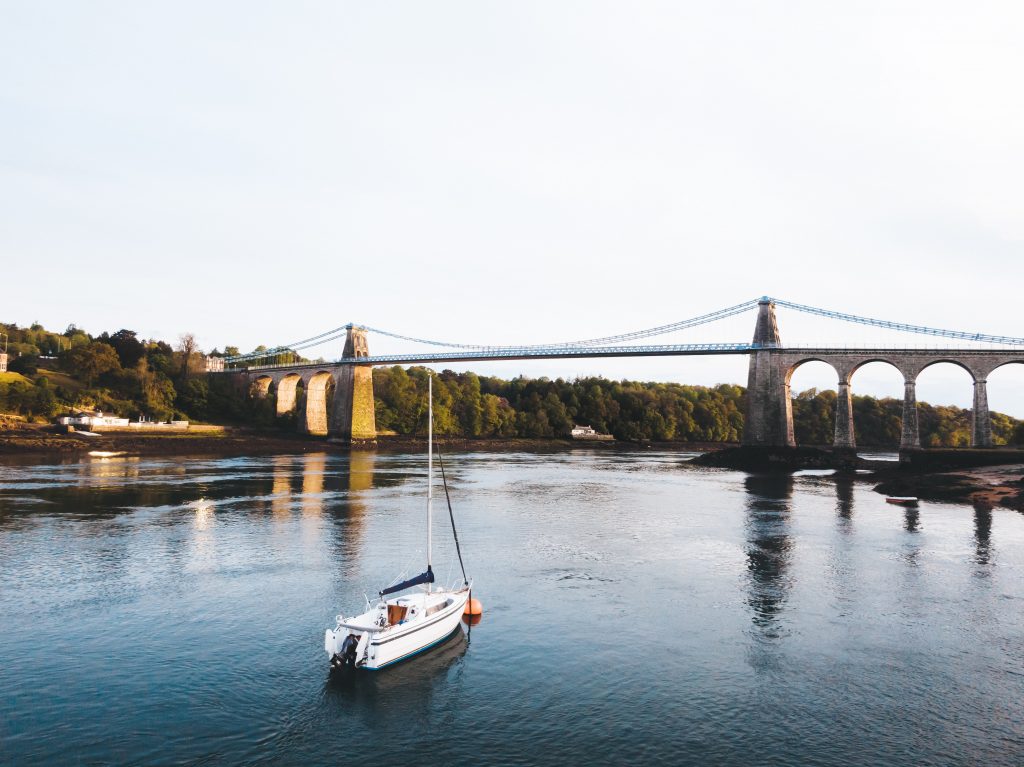
Dr Jeanette Reis and Louise Dixey call for a rethink of the impact of tourism and its role in carbon reduction.
We know that we should reduce our carbon footprint if we want to avoid the worst projected climate change impacts. As COP26 in Glasgow has just come to an end, it is time to consider our roles as tourists and tourism providers in this.
The Welsh Government has committed to reducing Wales’ carbon emissions to net zero by 2050 – with ambitions to get there sooner. This bold commitment is enshrined in law and sits within a complex economic, social, environmental, technological and political context. Wales is exceptional as a tourism destination in that sustainability is enshrined in law through the Well-being of Future Generations (Wales) Act 2015 and a dedicated Minister of Climate Change places our environment firmly on the political agenda.
As traditional heavy industries in Wales decline, this presents an opportunity for tourism to flourish and become a firm foundation for our future green economy.
“What we need to do now is make full use of the tools and resources that are out there, educate and train ourselves, try to put infrastructure in place to support sustainability, and ultimately try to make more sensible choices about where we go on holiday next year.”
The Welcome to Wales Tourism Strategy 2020-2025 – based on this Well-being of Future Generational Act – and the Welsh Government’s Low Carbon Action Plan aim to replace the majority of car journeys with public and active transport, encourage electric vehicles and implement charging points as part of tourism infrastructure. So, we’re not doing too badly, but there is still a long way to go to plug the gap between strategy and active implementation.
According to the Wales Tourism Performance Report , in 2019 (pre-Covid), around 11 million overnight trips to Wales contributed around £6billion to the economy. As domestic tourism steadily increases, we have a real opportunity to make the most of our extensive rural beaches, marine wildlife, canals, mountains, a coastal path, biking trails and castles – offering low carbon tourist activities, as well as urban activities such as sporting events, food and drink, arts and cultural experiences. Not all these activities have low carbon footprints, yet if we avoid long distance travel, they appear to be much more sustainable options.
Internationally the urgency of the need for tourism to decarbonise is being recognised. In 2020 a movement called Tourism Declares a Climate Emergency was founded by leading tourism businesses and at COP26 the Glasgow Declaration for Climate Action in Tourism will set out a commitment to climate action across the tourism industry. The question now is how to get buy-in and how to realise decarbonisation in tourism which has complex supply chains. Scientifically-based carbon measurement methodologies and offsetting are becoming more commonplace within the tourism industry, and while they might sound as though they will resolve many issues, they remain subject to controversy.
Robust debate and agenda-setting research. Support Wales’ leading independent think tank.
This implementation of carbon reduction measures relies partially on having tools to measure carbon footprints. Wales does not yet have a standardized methodology for assessing carbon footprints in tourism accommodation or travel, but really should. One such tool, used by UK Government for greenhouse gas reporting is called Hotelfootprints . This calculates useful metrics for accommodation providers and guests .The EcoPassenger tool is another useful carbon calculator tool that is easy to use and free to access. This one calculates carbon footprints for different modes of transport . Tools such as these can be very useful but need to be used much more extensively and consistently by tourists and tourism providers. In addition, users need to be aware that all models are simplifications of reality and that a number of assumptions are used. For example, the EcoPassenger tool assumes that 1.5 people are in a car and trains and planes have “normal levels of crowding”. And so the tools are not perfect, but they do provide a starting point for measuring our impacts.
Climate literacy and green skills development can also help with implementation of our sustainable development strategies. A researcher at Cardiff Met has been working with existing and future decision makers – school pupils, teachers, charity workers, small business owners and councillors, to explore climate change education and training in Wales. Creating climate for learning-experiences of education existing and future decision-makers about climate change found that existing climate change education and training provision was disjointed, publicly available information was overly complicated, and there was a lack of facilitation to support development of mitigation and adaptation measures. The research also concluded that climate literacy required investment in long term education and training activities, rather than one-off events.
In addition, the EU funded Next Tourism Generation Project research has shown an imperative to address sustainability skills gaps regardless of the type of tourism sector, business size and job level in Wales. An NTG Toolkit for education and industry is currently being piloted that includes open access modules on climate change , sustainable tourism and communicating sustainability. The Toolkit has been welcomed by the industry sector in Wales, although challenges remain in obtaining broad uptake. Taking all of this into account, we can see that there is a clear disparity between high level strategy and ground level implementation.
An unintended consequence of Covid has been that many UK tourists took domestic holidays during 2020 and 2021 and so inadvertently cut back on their travel and accommodation carbon footprints. The latest Tourism Barometer reported that all regions of Wales were busier than usual in 2021 and about half (48%) of accommodation providers have had more customers compared to pre-Covid times. Media reports suggest that the lower costs, easier transport and range of activities available for tourists in Wales will result in continued growth of the sector even when international travel fully resumes. Crucially, this has demonstrated that there is an appetite for domestic tourism, which by its very nature is more sustainable than international tourism.
As we can see, there are strategies, tools and examples of good practice out there which can be used to support decarbonisation and sustainable tourism and with a growing appetite for Welsh tourism, we don’t need to fly to Glasgow to do our bit! What we need to do now is make full use of the tools and resources that are out there, educate and train ourselves, try to put infrastructure in place to support sustainability, and ultimately try to make more sensible choices about where we go on holiday next year.
On 30 November and 1 December, the IWA will be hosting a two-day virtual economy summit which will see experts discuss the future of Wales after Covid-19. Register now .
All articles published on the welsh agenda are subject to IWA’s disclaimer .
Photo by Humphrey Muleba on Unsplash
Also within Politics and Policy

Mental Health: What Wales’ Further Education sector can learn from Slovenia

IWA Analysis: The contribution of business to a just energy transition with Wales & West Utilities
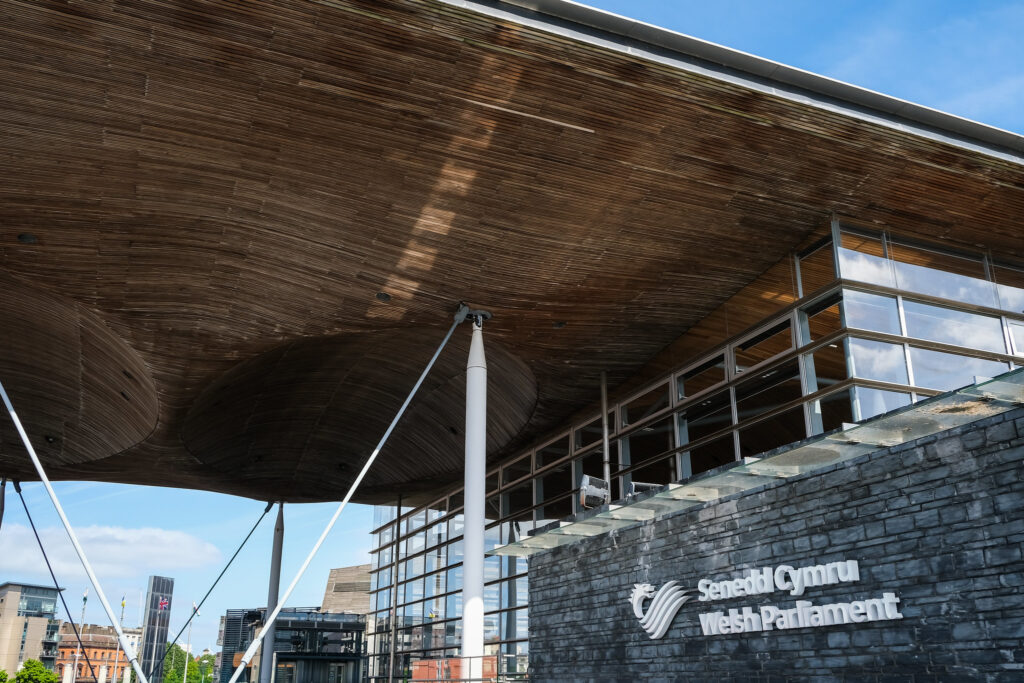
IWA Analysis: Building the Democratic Puzzle – MSs vote to support Senedd Reform
Sign up for our newsletter.
Institute of Welsh Affairs Room 6.01 sbarc|spark Maindy Road Cardiff CF24 4HQ
- Public Services
- Cookie Policy

Visit Wales confirms sustainability as the top priority in the new national tourism strategy
On October 9, the Next Tourism Generation Alliance partner, Cardiff Met , attended a Visit Wales Roadshow to learn of the new tourism strategy 2020-2025. The roadshow for the South-East region of Wales was held at Miskin Manor which has Green Key accreditation . The Roadshow was attended by approximately 100 people from the private, public and third sectors. The presentation began with a summary of key findings from a Visit Wales consultation exercise and the top strategic priority identified is sustainability. Louise Dixey summaries several key points relevant to NTG project implementation in Wales.
The top strategic priority for tourism development in Wales, sustainability, is reflected in five new goals. These are (1) economic growth (2) environmental wellbeing (3) cultural wellbeing (4) health wellbeing (5) satisfaction for visitors and locals . This represents a major change from the previous national strategy in which there was simply one goal: an increase of 10% in tourism revenue that has almost been achieved. That said, audience members highlighted that the five new goals should be given parity and economic growth should not be given priority.
Sustainability will also be central in future funding decisions on tourism projects made by the Welsh Government and job creation will no longer be the defining metric. This is significant as tourism has had more funds allocated for quality development over the next decade.
Skills shortages were identified as a challenge. The Director of Culture, Sport and Tourism for the Welsh Government, Jason Thomas, highlighted that “tourism needs to be a first-choice career” as skilled people were needed to provide quality visitor experiences. Furthermore, Visit Wales is planning to establish a physical marketing hub to help tourism businesses improve their digital skills.
The new strategy, Welcome to Wales: Priorities for the Visitor Economy 2020-2025 , once approved by the Welsh Assembly, will be formally launched in November.
Follow the efforts of the Next Tourism Generation via our website, Facebook, Twitter | #NTGskillsalliance or via LinkedIn
No Comments
Save my name, email, and website in this browser for the next time I comment.
This site uses Akismet to reduce spam. Learn how your comment data is processed .

- print Print
- error Feedback

Tourism: opportunities for growth
Article by Robin Wilkinson , National Assembly for Wales Research Service

Tourism economy spending in Wales is forecast to grow slightly more slowly than in the other UK nations, at an annual average of 3.7 per cent in real terms, to reach £11.9 billion in 2025, or 5.1 per cent of the UK total.
Though caution should be exercised when using economic estimates, this forecast does at least raise the question as to whether – when set against a backdrop of large forecasted growth in the sector – the Welsh Government’s aim to grow tourism earnings in Wales by 10 per cent by 2020 is particularly ambitious. Nevertheless, if tourism earnings are to grow in Wales by 10 per cent, a separate question is raised as to how much of this growth will come from the domestic and overseas markets. In 2013, 89.7 per cent of visitor spending in Wales was from UK residents (see: Tourism: Jobs and growth ). Currently – when compared to Wales’ UK population share of 4.9 per cent – Wales is punching above its weight in the domestic tourism market, representing 6 per cent of all domestic visitor spending in the UK. However, spending by overseas visitors is a different story. Oxford Economics estimates that in 2013 Wales attracted 2.6 per cent of spending by foreign visitors to the UK. When providing evidence to the Welsh Affairs Select Committee , tourism expert Professor Annette Pritchard noted a large decline in the number of visits to Wales from overseas tourists. In 1999 over 1 million staying visits were made by overseas tourists to Wales. This has dropped to 854,000 in 2012. However, Dr Pritchard noted that this trend is common to UK countries and regions outside of London. The question remains as to how much focus the Welsh Government should put on consolidating its current core domestic tourism market, and how much it should seek to grow the possibly untapped potential of overseas tourism for Wales, particularly from affluent markets such as Germany and North America. 2014 is shaping up to be a key year for the Welsh Government’s tourism aims. It recently announced a new structure for tourism support in Wales : from September, funding will cease for the Regional Tourism Partnerships (four public-private sector bodies that provided tourism support on a regional basis), with their function to be replaced by a new Regional Engagement Team within Visit Wales. Wales will also be visible on a world-stage in a way it perhaps hasn’t been since the Ryder Cup in 2010, when world leaders visit Newport for the NATO summit in September. This year also marks the centenary of Dylan Thomas’s birth, and a roster of events has been laid on to celebrate the legacy of this internationally popular literary figure. All these issues and more will be considered by the Assembly’s Enterprise and Business Committee as it carries out its forthcoming inquiry into tourism in Wales . The Committee is seeking people’s views on these issues in a consultation that closes on 14 May, with the Committee intending to start taking oral evidence from witnesses in June.
Helpful links
- Subscribe to knowledge exchange updates chevron_right
- Get involved with the Senedd’s work chevron_right
- Subscribe to updates chevron_right

Nuclear Energy: Made in Wales?

- NetZero Solutions
- Renewable Energy
- Manufacturing
- Built Environment
- Public Sector
TOURISM PARTNERS:
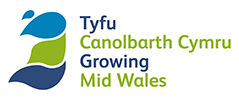
Developing a Sustainable Tourism Strategy
Developing a sustainable tourism strategy is vital to ensure continuous improvement, long-term viability and responsible development of tourism in Wales.
By setting clear objectives, continuing to have discussions and forming successful partnerships, we can continue to drive the industry forward.
In this special Green Economy Wales Digital Discussion, host Carwyn Jones is joined by Adrian Barsby, Vice Chair of Wales Tourism Alliance and Andy Middleton, Chief Exploration Officer at TYF, who shared their thoughts on what sustainable tourism means to them, what they believe needs to be done to drive the industry forward, how the industry is contributing to climate change and our personal responsibilities, what Wales needs to do to advance the concept of sustainable tourism and put it into practice and how seriously does the tourism industry take sustainability.
Related Articles
Swansea’s Dragon Hotel Bids to Become City’s Latest Green Landmark
Green key – unlocking sustainability in the hospitality industry, exclusive tourism industry interview – vaughan gething, panel discussion – an introduction to sustainable tourism, preseli venture – economic activity working in partnership with nature.
Wales 'significantly underperforms' promoting itself overseas according to new report
- Wales tourism
- Visit Wales
- Wednesday 12 July 2023 at 4:34pm
These Australians visiting Conwy told ITV News while they love Wales, they hadn't really heard about it before
With its beautiful beaches, captivating castles and magnificent mountain ranges - it begs the question why wouldn't anyone want to visit Wales?
Tourism makes a huge contribution to the Welsh economy, providing jobs for around 12% of the Welsh workforce.
But according to a new report by a group of MPs - put simply, not enough is being done to get more people from abroad choosing Wales when they're booking their next holiday.
It says compared with the rest of the UK, Wales "significantly underperforms" attracting international visitors and there needs to be a big improvement in the way Wales is marketed.
Terry and Karen, who were visiting Conwy from Woodend in Australia, said it was an "accident" that they ended up coming to Wales.
Asked whether they'd seen any adverts about the country before visiting, they told ITV News: "No, none."
"It was b asically from talking to people, and they'd go ‘you should really visit Wales’, but it was really never on our plans to visit."
Meanwhile, Lee and Ruth, from Melbourne, said they also had to find out about the country for themselves.
In 2019, of the 41 million international tourists that visited the UK, only one million visited Wales, and of the total amount spent by international tourists, just 2% was spent in Wales.
As a result, The Welsh Affairs Committee says Wales "punches below its weight" in attracting international visitors. It blames poor marketing, tour operators ignoring Wales and challenging transport connections.
It's now called for Wales' tourist board - Visit Wales - to come up with a better strategy by February 2024 to make the country a more desirable destination.
What does the report say is going wrong?
Poor profile - Despite its culture and language, Wales has a relatively low profile abroad compared to England, Scotland and Ireland.
Smarter strategy - It says its marketing strategy must be based on promoting Wales' unique strengths and attractions. It should also be more up to date with trends such as capitalising on a new American audience thanks to Ryan Reynolds and Rob McElhenny buying Wrexham football club and the subsequent global TV show 'Welcome To Wrexham'. It goes on to suggest adding more visitor attractions closer to Wrexham.
Clever collaboration - It says 'Visit Wales' should be working smarter with Britain's national tourism board 'Visit Britian' to make sure people considering a trip to the UK are exposed to the culture and experiences Wales has to offer. It says Visit Britain 'does not sufficiently promote Wales in its marketing materials' including its website. The Committee was surprised to hear that of those surveyed, 57% of overseas visitors to Wales had not seen any marketing beforehand. The report said tour operators fail to incorporate holidays in Wales in their packages, despite 27% of those tourists surveyed saying that they would consider taking longer trips if holiday packages were available.
Political push - It calls on UK Government bodies responsible for promoting Wales abroad to reflect the distinct identity of each part of the UK in their activities. The report says when the chief executive of 'Visit Britain' is also head of 'Visit England' - it's not convinced Wales is getting an equal amount of promotion and questioned 'Visit Britain's knowledge and expertise of Wales. It also thinks Wales could benefit from a tourist board which has more independence from the Welsh Government
Transport troubles - The report says both the UK and Welsh Governments have to work together to improve transport links in and out of Wales. During its visit to the USA earlier this year, the Welsh Affairs Committee heard that Wales’s poor transport infrastructure is deterring US tourists from considering Wales as a potential destination. It says major tourist attractions such as North Coast Way, Pembrokeshire and Snowdonia are hard to reach without a car, a journey made more challenging with the poor condition and lack of investment in the Welsh road network. It also mentions making rail links to Heathrow airport more accessible for services into Wales.
Tourism tax - It's split opinion since it was conceived but the report draws on concerns the proposed visitor levy may put off international tourists visiting Wales and and a result will make businesses that rely on tourists more at risk. It does say local authorities are best placed to judge whether the levy would have a positive or negative effect and wants the Welsh Government to look-again at the issue
A Visit Wales spokesperson said : “We are pleased to see the report highlight the positive work of Visit Wales in relation to our own marketing, engagement with the tourism industry in Wales, and co-working in the USA.
"We look forward to continuing to work with VisitBritain on how Wales is marketed within VisitBritain’s international campaigns, to tour operators, and in sharing of data with industry – which are crucial components of success in this highly competitive industry.”
The Welsh Conservatives have responded to the report saying: “Tourism accounts for 1-in-7 jobs in Wales, yet Labour Ministers in the Senedd do little to grow or even protect this vital sector of our economy.
“The Labour Government are intent on taxing the tourism industry to oblivion as opposed to enhancing the Welsh offer. A toxic tourism tax and crippling 182-day holiday let regulations are just a taster of what the socialists in Cardiff Bay have in store for Wales.
“The Welsh Conservatives would cancel Labour’s tourism tax plans, make Visit Wales independent of government, reverse Labour’s barmy road building ban and invest in infrastructure so that people can get around our great country.”

Tyfu ym Mhowys Grow in Powys

Support for Tourism
The key priorities of the tourism service are:
1. Marketing – digital and traditional methods, including the Mid Wales My Way website and social media platforms, Mid Wales visitor guide, events and exhibitions to raise awareness of Powys as a key visitor destination in Wales.
2. Destination Management – support for the 4 destination areas in Powys – Brecon Beacons, Cambrian Mountains, Dyfi Biosphere, Mid and North Powys. Find out more at Tourism Powys
3. Powys Events – a dual approach which involves the active promotion of the wide range of iconic events held in Powys, and working with The Welsh Government and other partners to attract major events to use Powys as a base.
Powys County Council tourism service undertakes a variety of research into tourism trends, visitor satisfaction, bedstock and the impact of tourism on the economy of Powys (STEAM).
Sitting on the Visit Wales research partnership, we gather data in conjunction with other organisations and local authorities in Wales.
Wales tourism research can be viewed - http://gov.wales/topics/tourism/researchmain/?lang=en
Partnership for Growth, the Tourism strategy for Wales can be viewed - http://gov.wales/topics/tourism/developmentl1/partnershipforgrowth/?lang=en
For further information, please contact us on [email protected]
Destination Management
Destination management is designed to make each destination work effectively from a visitor perspective. To do this effectively needs buy-in from a range of stakeholders involved in the delivery of visitor experiences on the ground. Working in partnership is essential to ensure the overall quality of services and facilities is in line with visitor needs and expectations. Destination management keeps the visitor, their needs and the quality of the experience they receive at the heart of what it does.
Powys County Council tourism service is committed to developing and supporting a destination management approach, as endorsed by Visit Wales in the ‘Partnership for Growth’ Tourism Strategy. The tourism service works in partnership with Visit Wales, partner organisations, tourism businesses, clusters and community groups in the following 4 destinations that make up Powys –
· Brecon Beacons
· Cambrian Mountains
· Dyfi Biosphere
· Mid and North Powys Destination Network
Powys County Council’s tourism service has a dual role in delivering the visitor marketing priorities of the council to target key visitor groups, alongside supporting the ongoing development of the tourism sector in Powys, in particular working to support businesses and communities which provide services to visitors.

Research & Strategies
Research & Strategies please see below links to research & strategies
UK Tourism Consumer Tracker Survey: Wales profile report 2024
Consumer sentiment tracking survey aiming to understand confidence, intent and barriers to take overnight short breaks and holidays in the UK and Wales. https://www.gov.wales/uk-tourism-consumer-tracker-survey-wales-profile-report-2024
Tourism Barometer: February Wave, 2024
The Barometer assesses business confidence in the Welsh tourism industry and provides indicative results at national, regional and sectoral level for February wave 2024. https://www.gov.wales/tourism-barometer-february-wave-2024
Domestic GB Tourism Statistics (day trips in Wales): October to December 2023
Data on day trips by British residents to destinations throughout Britain for October to December 2023. https://www.gov.wales/domestic-gb-tourism-statistics-day-trips-wales-october-december-2023
Wales Tourism Accommodation Occupancy Surveys: July to September 2023
This Accommodation Occupancy report provides information on the occupancy levels of serviced and self-catering accommodation, as well as hostels and camping/caravan sites. There is also third-party data from Transparent (short term lets), and STR Global (large hotel chains). Serviced Accommodation STR Self Catering Hostel Camping and Caravan https://www.gov.wales/wales-tourism-accommodation-occupancy-surveys-july-september-2023
Tourism Barometer: summer wave 2023
The Barometer assesses business confidence in the Welsh tourism industry and provides indicative results at national, regional and sectoral level for summer wave 2023. https://www.gov.wales/tourism-barometer-summer-wave-2023
Museum Spotlight Survey: 2022
The report sets out the key findings from the current round of the Museum Spotlight Survey. https://www.gov.wales/museum-spotlight-survey-2022
Domestic GB tourism statistics (overnight trips in Wales): 2022
Data on overnight trips by British residents to destinations throughout Britain for 2022. https://www.gov.wales/domestic-gb-tourism-statistics-overnight-trips-wales-2022-html
Wales tourism accommodation occupancy surveys: January to March 2023
The occupancy surveys provide trend information on the demand for tourist accommodation in Wales for January to March 2023. https://www.gov.wales/wales-tourism-accommodation-occupancy-surveys-january-march-2023
Domestic GB Tourism Statistics (day trips in Wales): 2022
Data on day trips by British residents to destinations throughout Britain for 2022. https://www.gov.wales/domestic-gb-tourism-statistics-day-trips-wales-2022-html
Events Strategy Wales 2022 – 2030
Visit wales accommodation occupancy survey annual report 2021.
The occupancy survey provide trend information on the demand for tourism accommodation in Wales for 2021 https://businesswales.gov.wales/news-and-blogs/news/visit-wales-accommodation-occupancy-survey-annual-report-2021
Wales Visitor Economy Profile report
Summary of employment, earnings, enterprises, expenditure and output data relating to the tourism and hospitality industries in Wales for 2021. https://gov.wales/wales-visitor-economy-profile-2021
Tourism and events coronavirus (COVID-19) impact surveys
https://gov.wales/tourism-and-events-coronavirus-covid-19-impact-surveys
Tourism profile –Wales Local Authorities 2011-19
Tourism-related data on local authorities in Wales for the period 2011-2019. The profiles contain tables on domestic overnight,domestic day visitors, and international overnight visitors
Tourism Profile North Wales 2017-2019
Tourism related data for the North Wales region for the period 2017-2019 providing comparisons with the overall GB level, all-Wales level and the other regions of Wales.
Wales Visitor Survey 2019 Qualitative Research Findings
Wales visitor survey 2019 overseas visitors, wales visitor survey 2019 uk day visitors, wales visitor survey 2019 uk staying visitors, great britain day visits survey: 2019, great britain tourism survey: 2019.
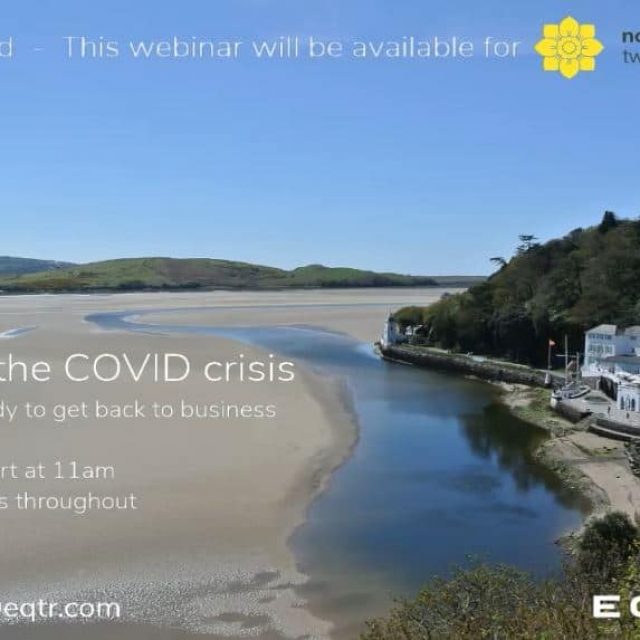
Tourism in the COVID-19 crisis webinar
Recording of the Tourism in the COVID-19 crisis webinar from Friday 15th May 2020. White paper What travel brands should do during the COVID-19 crisis download that accompanies the webinar.
2018 Steam data for North Wales
Steam provides the key data for measuring the performance of tourism in North Wales STEAM Wales Summary 2018 STEAM Report North Wales 2018
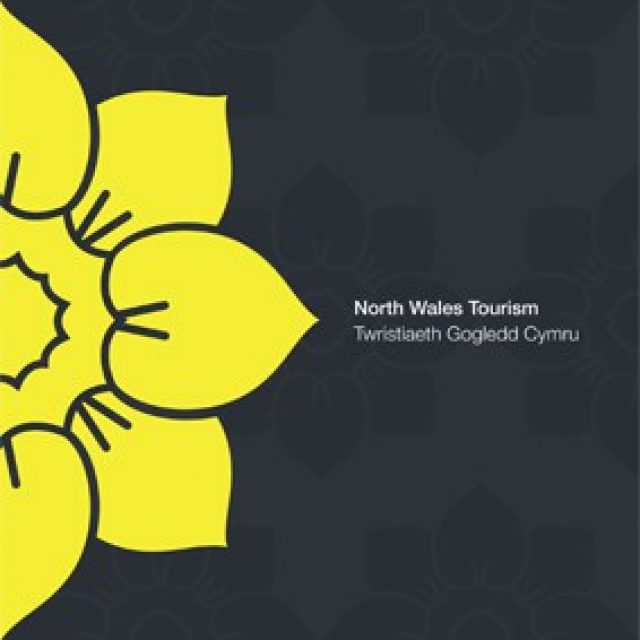
Assessing Zip World’s Impact on the North Wales Economy Review 2018
IntroductionZip World are a Sunday Times Fast Track 100 company. An assessment of Zip World’s impact on the North Wales economy was undertaken in 2016. The assessment reviewed the attraction’s economic impact by examining the value of visitor spend and employment opportunities made available. (For the purpose the report the participant who took part in […]
Wales Food Case Study – Llechwedd Slate Caverns
As part to the Welsh Governments Wales: A Food Destination campaign that promotes Wales as A Food Destination the below video is of Llechwedd Slate Caverns.
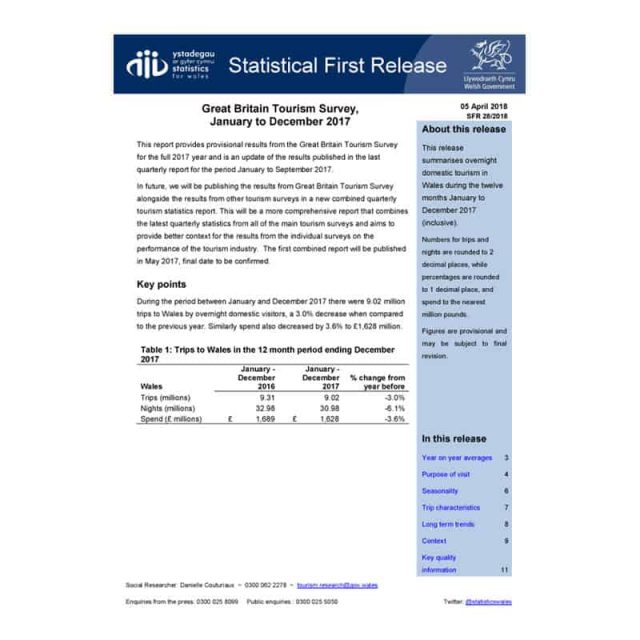
Great Britain Tourism Survey, January to December 2017
Introduction This report provides provisional results from the Great Britain Tourism Survey for the full 2017 year and is an update of the results published in the last quarterly report for the period January to September 2017. In future, we will be publishing the results from Great Britain Tourism Survey alongside the results from other […]
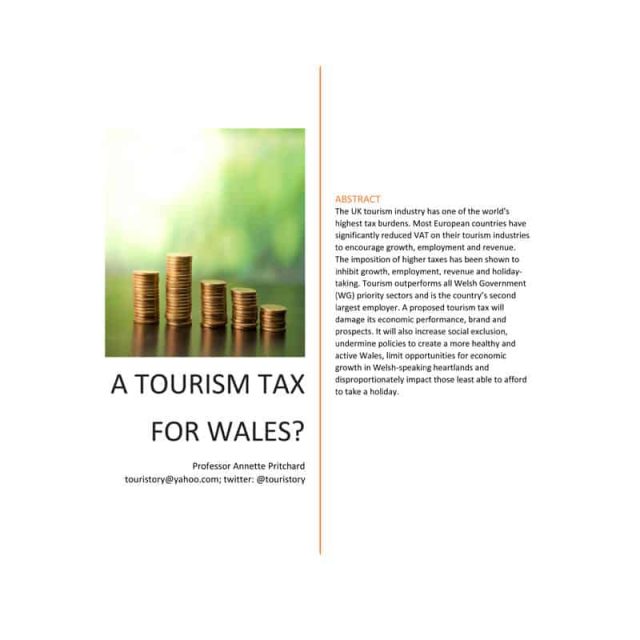
A Tourism Tax For Wales?
The UK tourism industry has one of the world’s highest tax burdens. Most European countries have significantly reduced VAT on their tourism industries to encourage growth, employment and revenue. The imposition of higher taxes has been shown to inhibit growth, employment, revenue and holiday-taking. Tourism outperforms all Welsh Government (WG) priority sectors and is the […]
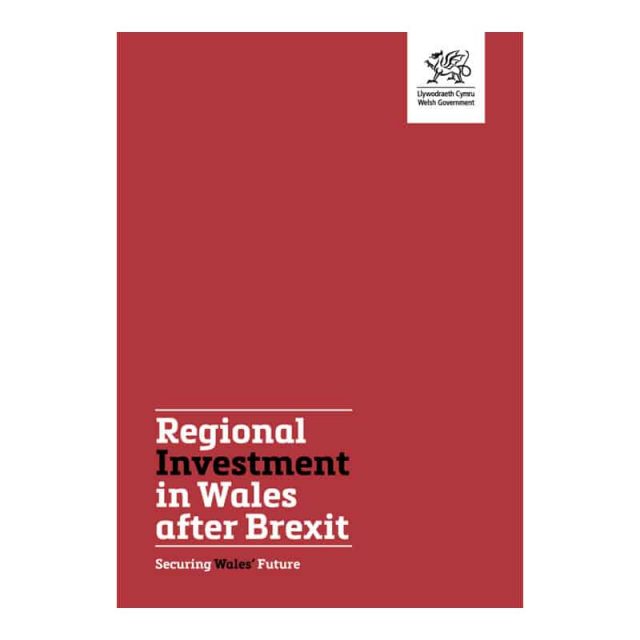
Regional investment in Wales after brexit
Introduction In the White Paper Securing Wales’ Future (January 2017), the Welsh Government sets out six priorities for the UK’s future, outside of the EU. One of those priorities is the importance of continued devolved funding and regional investment of at least the level Wales currently receives from the EU. This new policy document develops […]
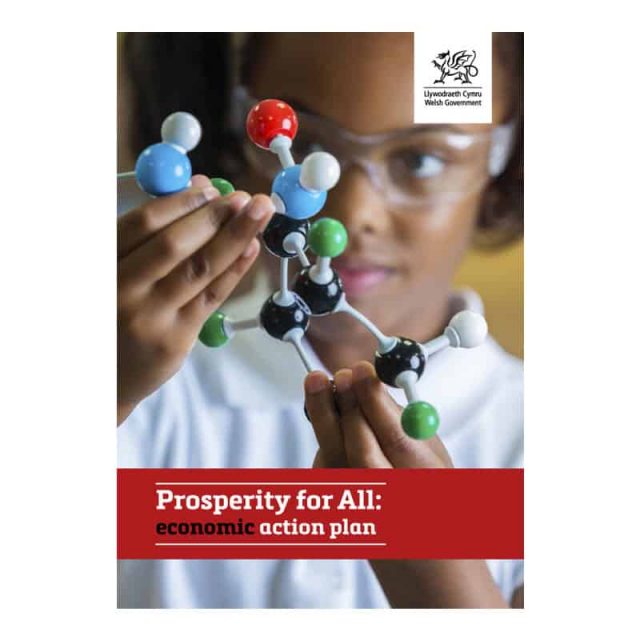
Prosperity for All economic action plan
Introduction In pursuing prosperity for all, we intend building an economy on strong foundations, to supercharge our industries of the future and empower all our regions to become more productive. And we wish to see growth with a purpose – inclusive growth – so that as our wealth and well-being improve, inequalities across our country […]
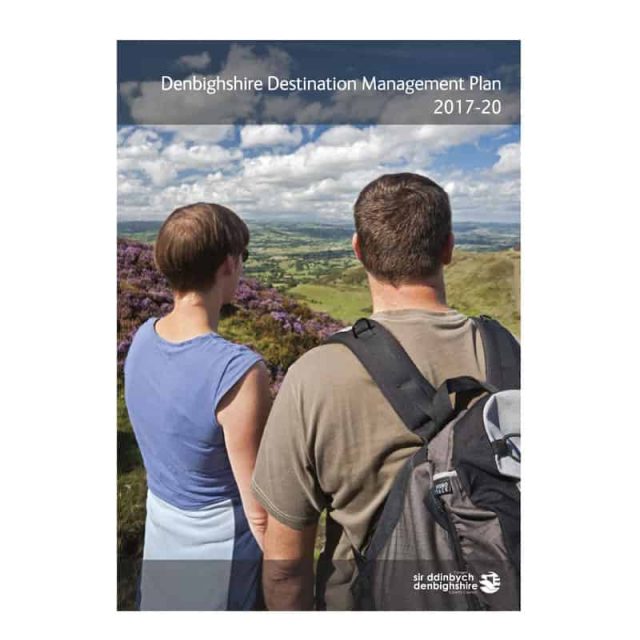
Denbighshire Destination Management Plan
Introduction Develop a thriving visitor economy in Denbighshire which celebrates the unique strengths of the county, supports jobs, generates business opportunities and improves the range and qualities of amenities available for visitors and residents whilst safeguarding the local environment. Click image to download
Final Mile, best practice guidelines
Introduction Encouraging more overseas visitors to explore Britain is a top priority; it spreads the economic benefit across nations and regions beyond London, and supports growth, job creation and retention. The recent government Tourism Action Plan (launched in August 2016) supports this ambition and identifies rail as a key enabler to persuade overseas visitors to travel beyond London. Click image to […]
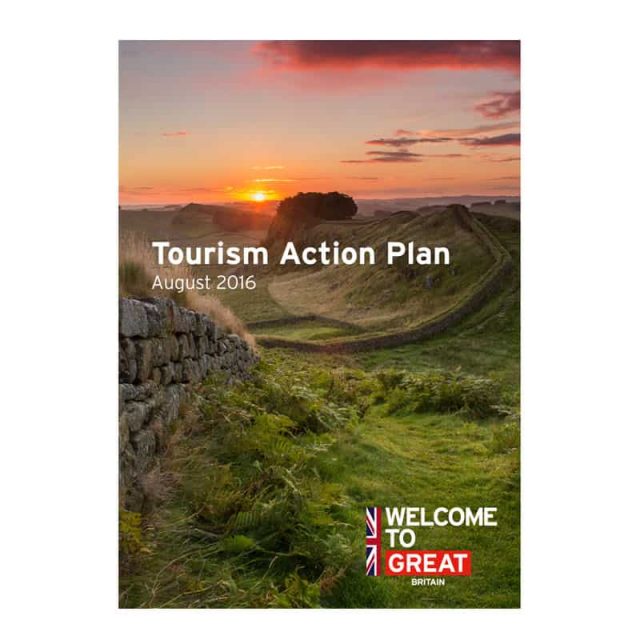
Tourism Action Plan
Introduction Tourism is vitally important to the UK. The industry provides 1.6 million jobs across the country. In 2015, we saw the greatest number of overseas visits to the UK on record, bringing £22.1 billion into our economy. Domestic overnight spend also hit a record high of £19.6 billion in England. In short, the sector goes […]
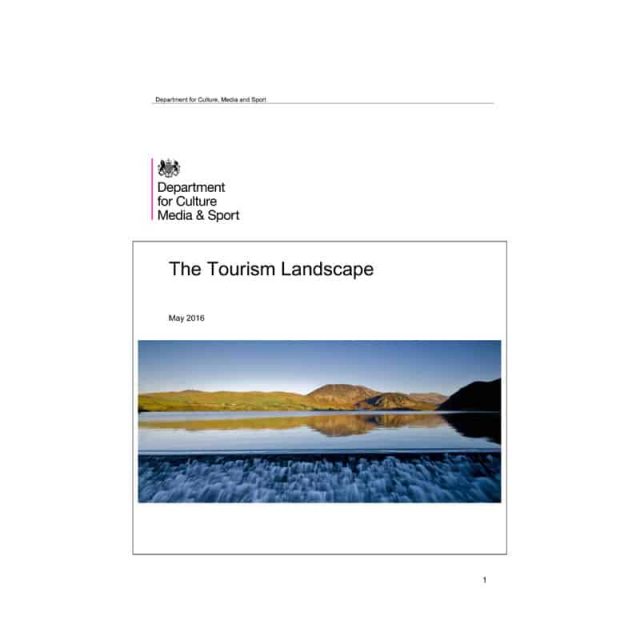

The Tourism Landscape
The Tourism Landscape: Department for Culture, Media and Sport Introduction The overall success of the tourism industry is contingent on its ability to work together to promote what it has to offer. However, as the sector is diverse, fragmented and competitive, businesses are often reluctant to invest significant time in collaborative endeavours. This is why […]
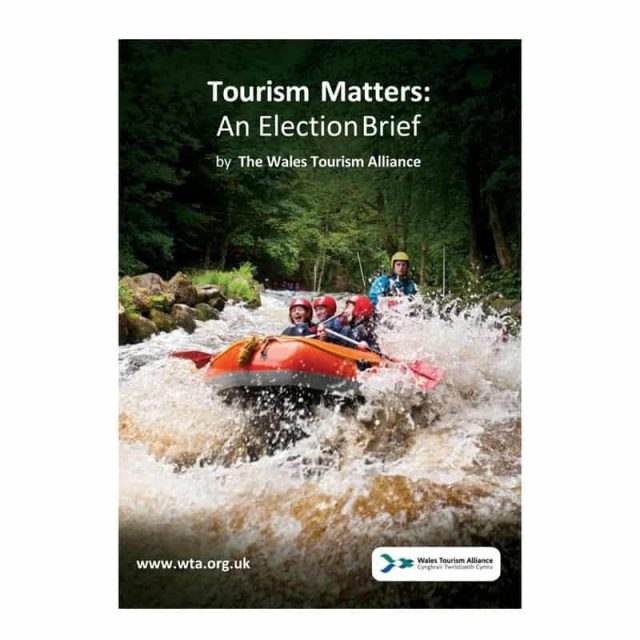
Tourism Matters: An Election Brief by The Wales Tourism Alliance
Tourism Matters: An Election Brief by The Wales Tourism Alliance Click image to download
The Food Tourism Action Plan for Wales 2015 – 2020
Introduction Food Tourism is defined by Welsh Government as ‘any activity that promotes a high quality, distinctive, local and sustainable food experience linked to a particular place‘. ‘Towards Sustainable Growth: An Action Plan for the Welsh Food and Drink Industry 2014-2020’ recognises the importance of the local food supply chain to the food industry in Wales, encompassing local retail, hospitality/ food service and direct retail […]
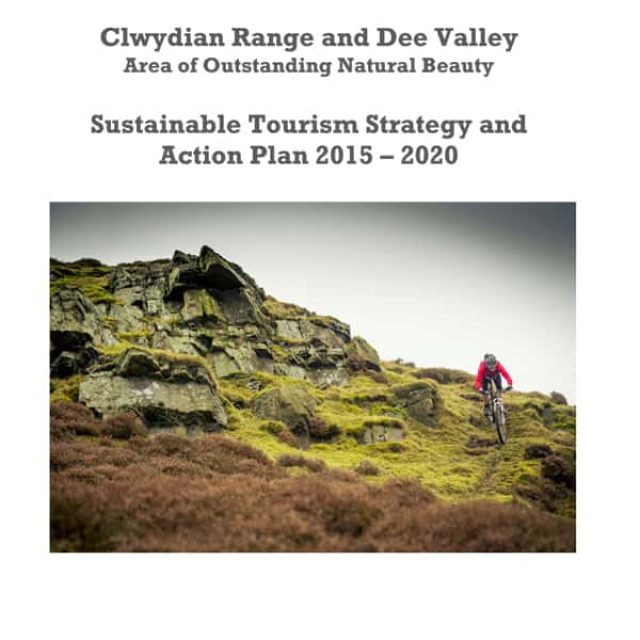
Clwydian Range and Dee Valley Area of Outstanding Natural Beauty Sustainable Tourism Strategy and Action Plan 2015 – 2020
Introduction The Sustainable Tourism Strategy and Action Plan for the Clwydian Range and Dee Valley Area of Outstanding Natural Beauty (AONB) covers a five year period from 2015 to 2020. It has been based on extensive consultation and assessment, through meetings, workshops, surveys and analysis of available evidence. Its purpose is to provide a direction […]
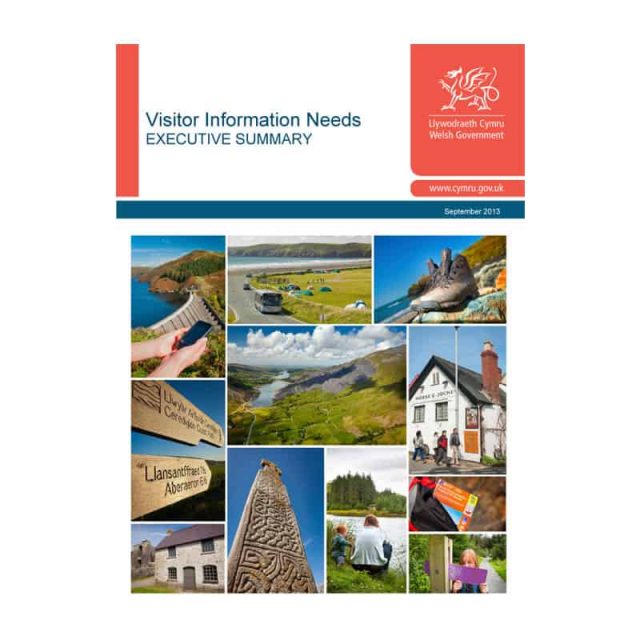
Visitor Information Needs, Visitor Survey 2013
Visitor Information Needs EXECUTIVE SUMMARY Click image to download
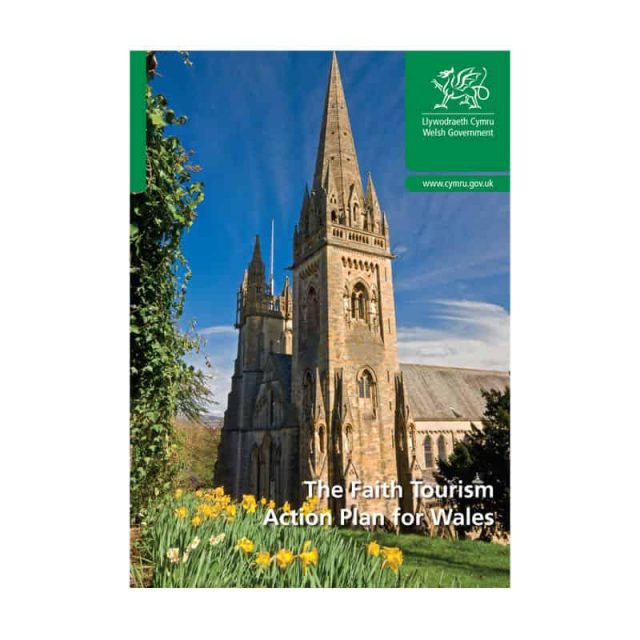
The Faith Tourism Action Plan for Wales
The Faith Tourism Action Plan will aim to identify ways in which this significant part of our heritage can be enhanced as an attraction to visitors and locals alike. This action plan will focus on developing the Faith Tourism product as part of the wider visitor experience, although there could be scope to develop the niche […]
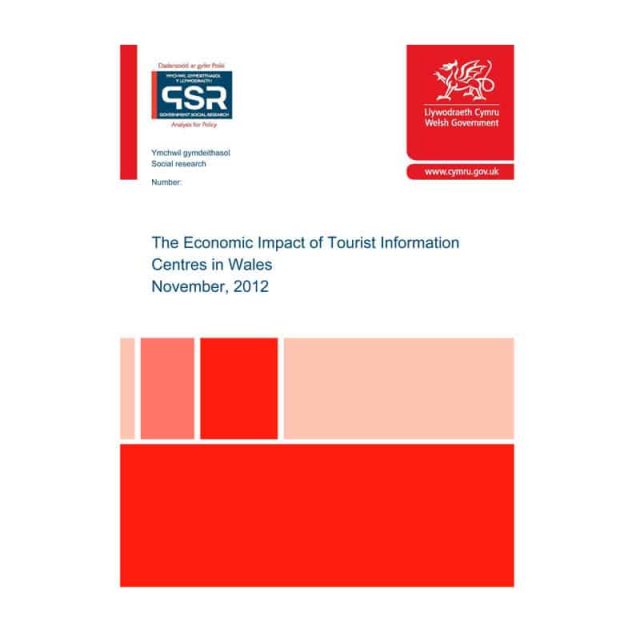
The Economic Impact of Tourist Information Centres in Wales November, 2012
Research Aim The Welsh Government commissioned Beaufort Research in association with Houston Economic Consulting to identify and value the additional economic activity occurring at a given time in a local economy as the result of Tourist Information Centres (TICs). Research Methodology The work had two stages, the first stage involved engaging with a representative sample […]
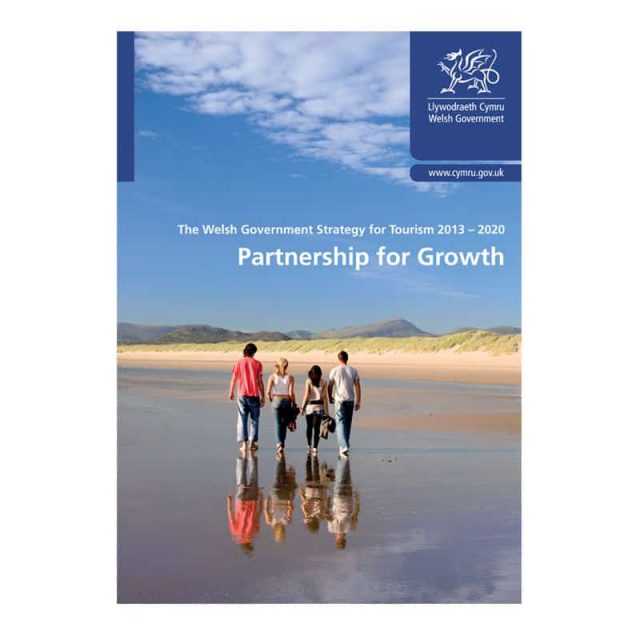
The Welsh Government Strategy for Tourism 2013 – 2020 Partnership for Growth
A Tourism Strategy for Wales The Minister for Economy, Science and Transport established a Tourism Sector Panel in September 2011 and asked them to lead the development of a new strategy and direction for the sector. This strategy represents the results of their work which has involved a process of research and analysis, evaluation of […]
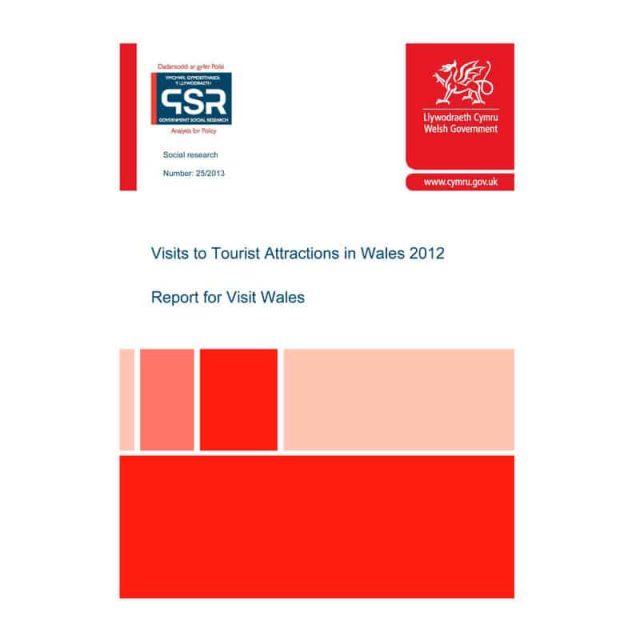
Visits to Tourist Attractions 2012
Background Visit Wales (VW) have been conducting the Survey of Visits to Tourist Attractions since 1973. The remit of the research is to Determine and report visit numbers to attractions throughout Wales – analyse collected data on visit numbers to identify current trends Provide additional comparative analysis of data contained in the Survey of Visits […]
Britain Growth Strategy inbound Golden Legacy 2012 to 2020
Introduction This is a strategy for Britain’s travel and tourism industry through to 2020. It highlights the potential for our visitor numbers to grow by 23 per cent to 40 million, the potential to add 200,000 jobs in an economy where new jobs are the number one priority and the potential to generate £8.7 billion in additional foreign […]
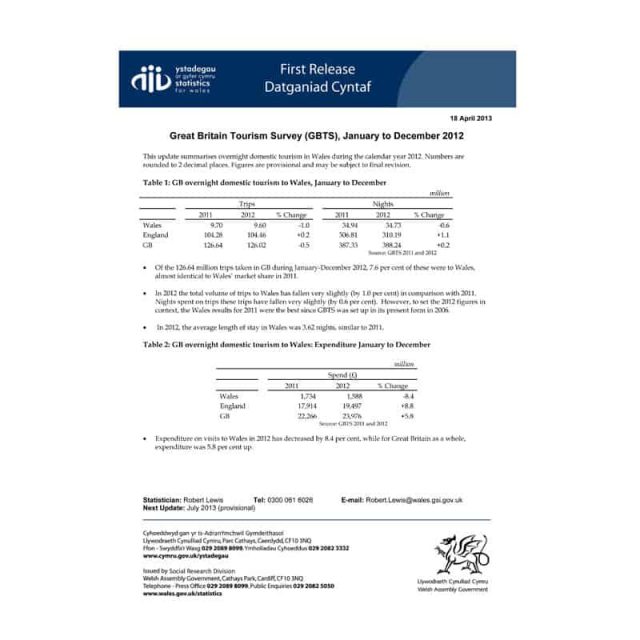
Great Britain Tourism Survey (GBTS)
Great Britain Tourism Survey (GBTS), January to December 2012 This update summarises overnight domestic tourism in Wales during the calendar year 2012. Numbers are rounded to 2 decimal places. Figures are provisional and may be subject to final revision. Click image to download
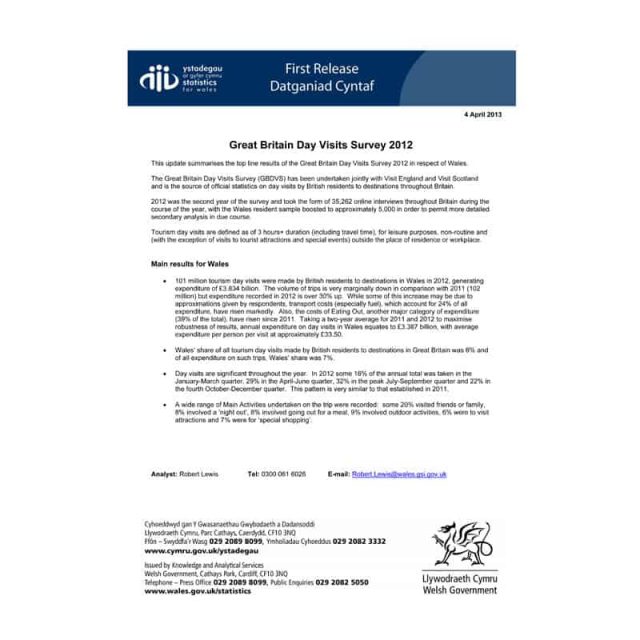
Great Britain Day Visits Survey 2012
This update summarises the top line results of the Great Britain Day Visits Survey 2012 in respect of Wales. The Great Britain Day Visits Survey (GBDVS) has been undertaken jointly with Visit England and Visit Scotland and is the source of official statistics on day visits by British residents to destinations throughout Britain. 2012 was […]
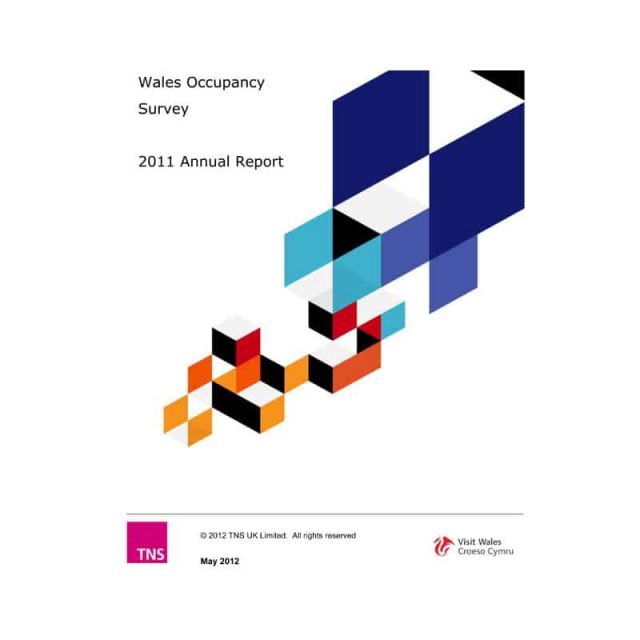
Wales Occupancy Survey – 2011
An occupancy survey has been continuously undertaken amongst graded hotel accommodation providers since 1972 to monitor levels of demand for hotel rooms and beds in Wales. To comply with the requirements of the EU Directive on Tourism Statistics, the survey was extended in 1997 to include all serviced accommodation including guest houses and bed and breakfast […]
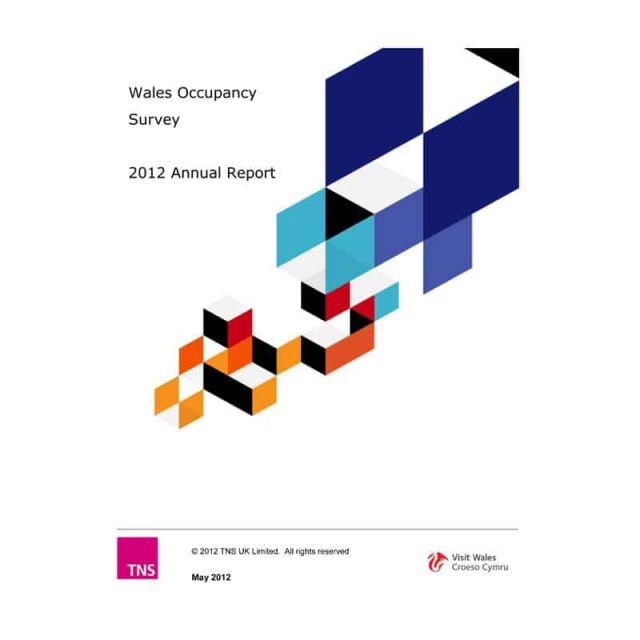
Wales Occupancy Survey 2012 Annual Report
An occupancy survey has been continuously undertaken among graded hotel accommodation providers since 1972 to monitor levels of demand for hotel rooms and beds in Wales. To comply with the requirements of the EU Directive on Tourism Statistics, the survey was extended in 1997 to include all serviced accommodation including guest houses and bed and […]
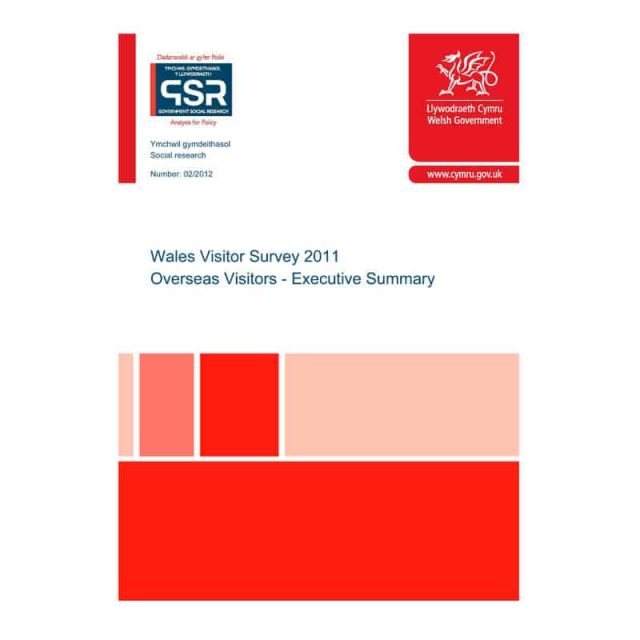
Wales Visitor Survey 2011 – Overseas Visitors
As part of its statutory function to promote, develop and monitor tourism in Wales, Visit Wales undertakes a regular programme of research to provide information on the volume, value and character of tourism in Wales. In late 2010 Visit Wales commissioned Beaufort Research to conduct a research study amongst overseas and UK Visitors to Wales, […]
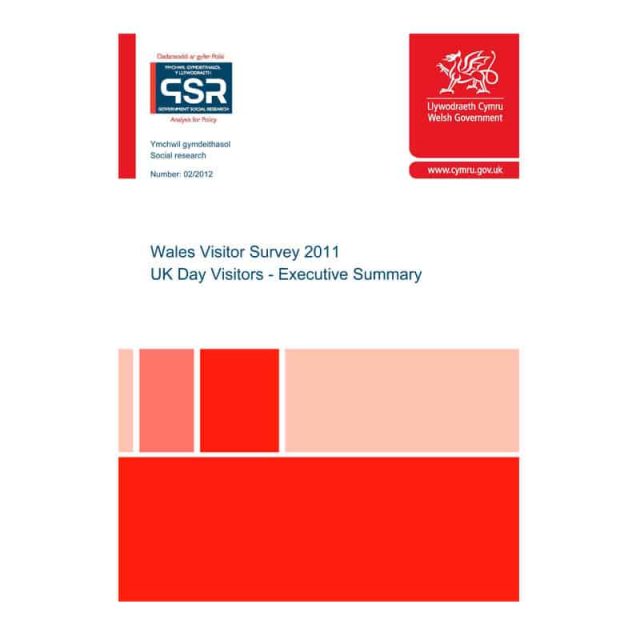
Wales Visitor Survey 2011 – UK Day Visitors
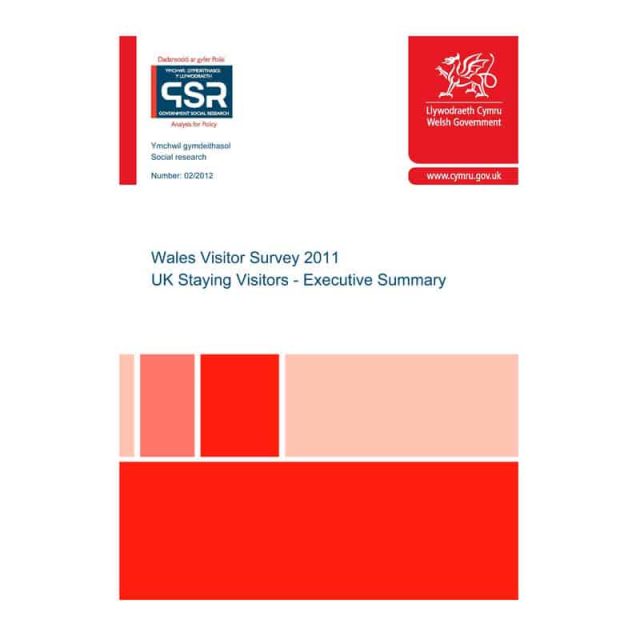
Wales Visitor Survey 2011 – UK Staying Visitors
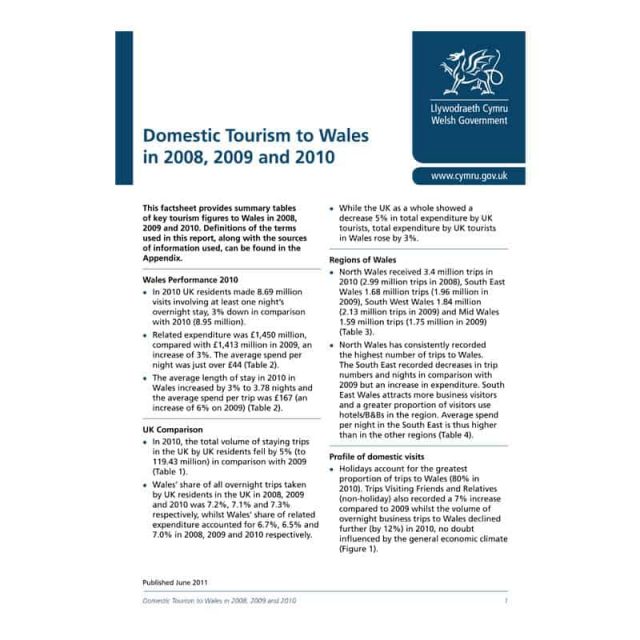
Domestic Tourism to Wales in 2008, 2009 and 2010
This fact sheet provides summary tables of key tourism figures to Wales in 2008, 2009 and 2010. Click image to download
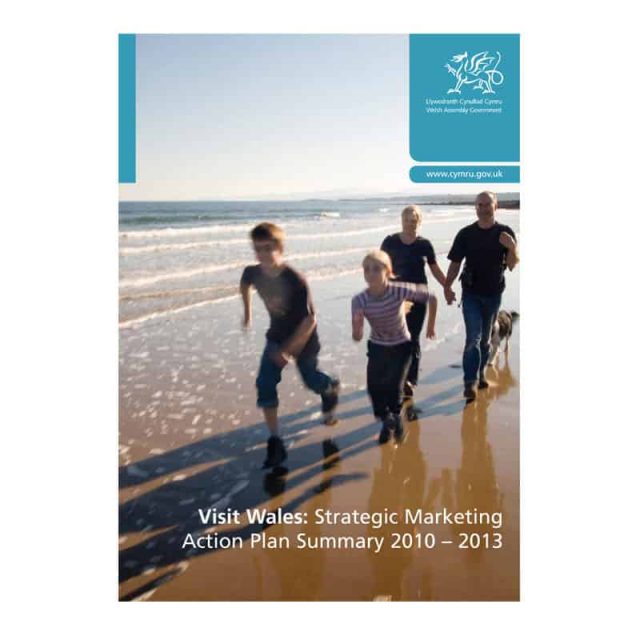
Visit Wales Strategic Marketing Acion Plan 2010 – 2013
The Strategic Marketing Action Plan (SMAP) provides a framework within which action plans for Visit Wales’s marketing activities are developed. It does not replace these action plans. The action plans will be consistent with the principles set out in SMAP, but will always reflect developing market conditions and the needs of our stakeholders in the […]
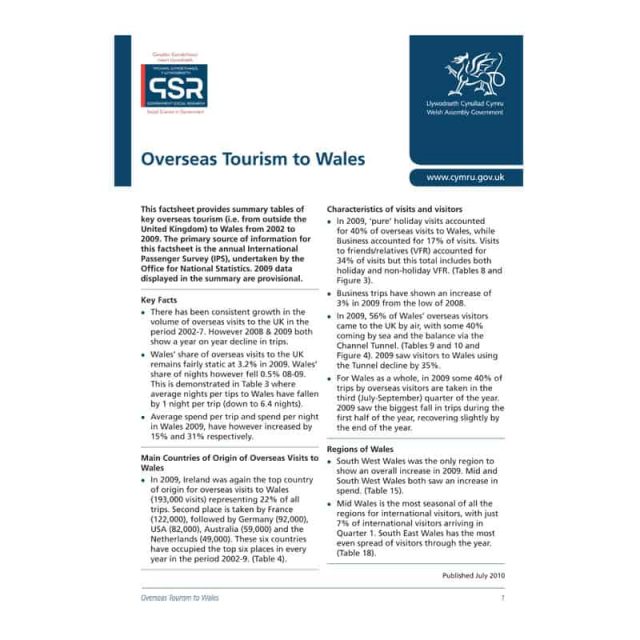
Overseas Tourism to Wales
This fact sheet provides summary tables of key overseas tourism (i.e. from outside the United Kingdom) to Wales from 2002 to 2009. The primary source of information for this fact sheet is the annual International Passenger Survey (IPS), undertaken by the Office for National Statistics.
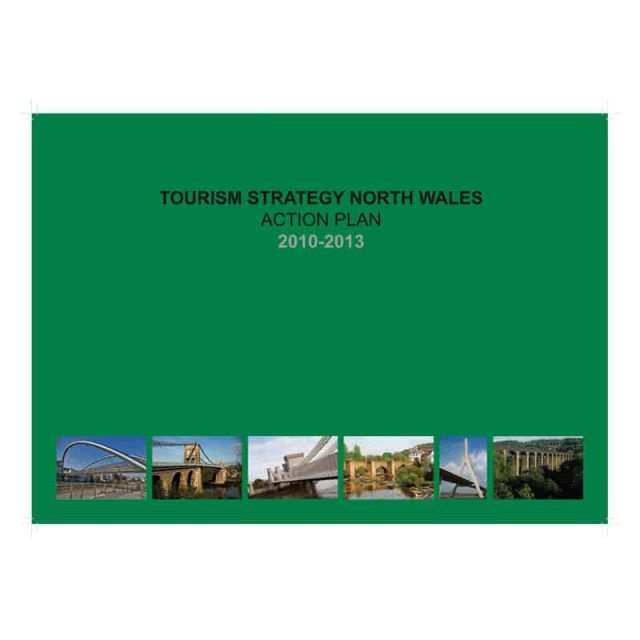
Tourism Strategy Action Plan 2010-2013
Tourism Partnership North Wales Tourism Strategy Action Plan 2010-2013
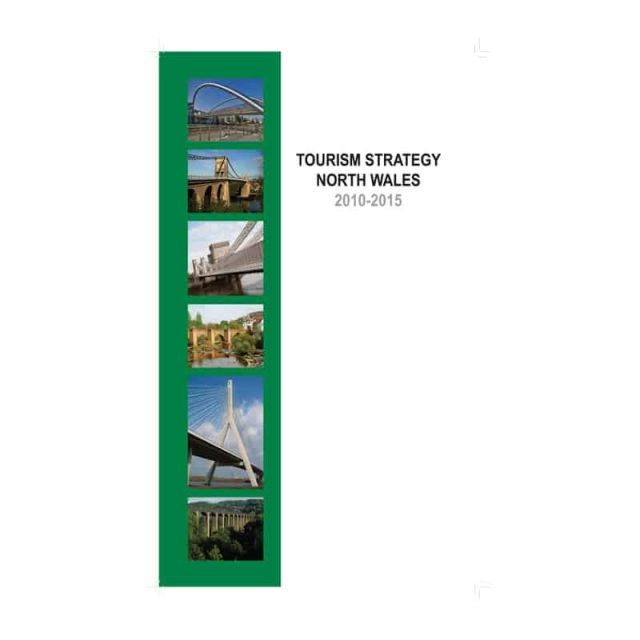
Tourism Strategy North Wales 2010-2015
The importance of tourism and the visitor economy Tourism generates £1.8bn for the North Wales economy each year, supports an estimated 37,500 jobs and is a lifeline for numerous small businesses. There is potential for further growth. Like an export industry tourism brings money into the region from outside and North Wales would be poorer […]
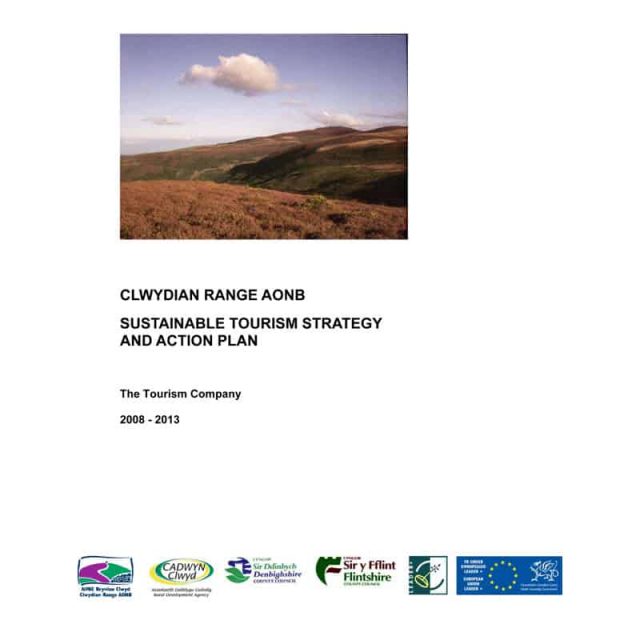
Clwydian Range AONB – Sustainable Tourism Strategy & Action Plan
The Clwydian Range Area of Outstanding Natural Beauty (AONB) is one of only a small number of locations in Wales designated for the exceptional quality of its landscape, which is linked to its historical and cultural heritage. This quality means that the Range can play a very significant role in the overall appeal of North […]
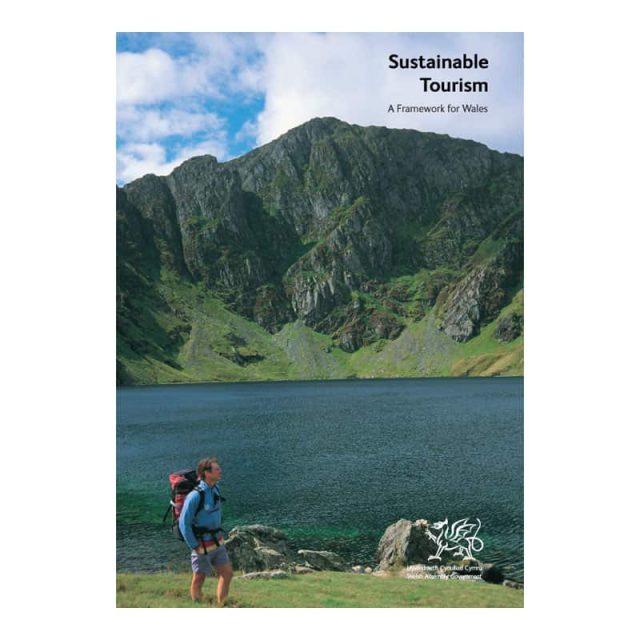
Sustainable tourism a framework for Wales
Introduction The purpose of this sustainable tourism framework is to outline what sustainable development means for the tourism sector in Wales. Its purpose is to guide those involved in promoting and developing tourism in the public, private and voluntary sectors, nationally, regionally and locally to ensure that the tourism industry contributes to sustainable development in Wales. Click […]
Privacy Overview
Cymru Wales Metaverse
Explore wales in the metaverse.
Build your itinerary and collect dragons, whilst learning about the must-visit sights in an immersive Wales metaverse.
Related stories
Visit our unesco world heritage sites in wales.
Find out how to make the most of your visit to each of the four UNESCO World Heritage Sites in Wales.
- UNESCO Heritage
- Amazing places
Instagram-friendly Welsh landmarks
Take a look at these ten must-see Instagrammable coastal landmarks for you and your camera.
- Countryside
Is Wales the castle capital of Europe?
With over 400 castles, wherever you go on holiday in Wales, you won't be too far from one to visit.
- Historic buildings
A Royal Mint experience
Discover the history of coins and how they are made at the Royal Mint Experience in Llantrisant.
Before you start...
This site uses animations - they can be turned off.
Terms and Conditions
By using this site, you confirm you agree to our Terms and Conditions .
We'd Like to Hear From You
By answering a few questions , we'll give you the chance to win £500. By doing so you will also help us improve this website and help with your holiday planning and travel needs.
Good for you. Good for us. Teamwork!
- According to our Build for the Future survey, a small group of forward-thinking travel businesses have cultivated key attributes that help them thrive.
- Travel leaders have 45% more capabilities in differentiated people advantage than laggards because they upskill existing personnel and attract and retain new talent, which allows them to offer customers a better experience.
- Leaders have 68% more AI capabilities than laggards because they deploy advanced analytics throughout the travel value chain to offer hyper-personalization.
Subscribe to read our latest insights on Travel and Tourism.

Travel and Tourism
/ slideshow, building the travel company of the future, key takeaways.
The following insights are part of BCG’s Build for the Future series, based on three years of research conducted on digital transformations at major organizations around the globe.
Planning a trip once meant consulting a guidebook or working with a travel agent. Today, people may plan a getaway based on a TikTok influencer’s recommendation, an online review, or a personalized ad fed to them by an algorithm.
These and other evolving consumer behaviors, coupled with cost pressures, are redefining competition in the travel business and the capabilities needed to succeed. As a result, the travel industry is facing challenges in all sectors, including airlines, hotels, theme parks, and cruise lines. The challenges are especially acute for long-time incumbents playing catch-up with digital natives.
Against this background of change, a handful of travel companies are thriving. According to our Build for the Future survey, the most forward-thinking travel businesses share a number of common attributes. These traits allow them to excel regardless of customer or market pressures and produce financial and nonfinancial outcomes that outshine those of their peers. (See “Build for the Future.”)
Build for the Future
- Five areas that are fundamental to success
- The emphasis of transformation efforts
- How successful transformation efforts have been
- The degree to which each of more than 50 potential influencing capabilities were in place
At a Glance
Our Build for the Future survey identified a small cadre of companies we refer to as “future-built,” with attributes that make them more ready than their peers for what’s on the horizon. These traits include: aligned leadership and purpose, differentiated people advantage, agile operating model, innovation-driven culture, modern technology platforms, and AI .
Future-built travel companies use these attributes as a springboard to improve their performance in four specific areas:
- Customer Experience. They elevate travel experiences by designing seamless, digital-first customer journeys, enhancing touchpoints, and reimagining loyalty to foster lasting connections.
- Commercial Excellence. They sharpen their competitive edge by using dynamic pricing and revenue management strategies, crafting tailored marketing narratives, and accelerating growth through digital sales channels.
- Operational Innovation. They infuse operations with digital agility, they forecast and preempt maintenance needs, and they execute capital projects with precision to redefine operational excellence.
- Cost and Resilience. They employ a holistic view of managing costs, embed zero-based budgeting principles, and streamline procurement to lift efficiency and instill resilience.
Among the 24 industries analyzed in our Build for the Future research, travel is one of the more advanced when it comes to being ready for the future. That’s primarily because of the advanced practices used by digital newcomers. Long-time travel players, however, trail the majority of incumbents in comparable consumer-facing industries when it comes to future readiness. In particular, travel incumbents lag in adopting innovation-driven cultures and cultivating a differentiated people advantage.
Read the slideshow to learn more about the survey findings.

Focusing on People and AI
The difference between travel industry leaders and laggards is particularly acute in two areas:
Differentiated People Advantage. Travel industry leaders have an edge in upskilling existing personnel and attracting and retaining new talent, which allows them to offer customers a better experience booking travel or taking a trip. Leaders in the hospitality sector of the travel business, for example, improve hiring and retention through continuous benchmarking to ensure that compensation is equal to or above that for comparable jobs in other industries, and by offering flexible schedules. Hospitality leaders also support diversity and inclusion. They also target messaging, outreach programs, and other actions to appeal to specific groups of current, past, and prospective employees.
AI. Travel industry leaders deploy advanced analytics and AI throughout the travel value chain. By optimizing their supply chain and offering hyper-personalization, these bionic companies successfully combine human and advanced technology capabilities, gaining a competitive advantage that can take a variety of forms. During severe weather, airlines use these capabilities to minimize customer travel disruptions by selecting the next best flight schedules. Cruise lines use their combined people and advanced technology capabilities to fine-tune pricing during cruise booking periods to maximize occupancy and revenue.
How Travel Industry Incumbents Can Catch Up
To become future-built travel businesses, companies might consider the following moves to foster the six winning attributes we’ve identified:
Aligned Leadership and Purpose. Leadership is central to becoming future-built. Companies in industries of all types with a systematic and well-supported approach to activate leaders see transformation success rates that are three times higher than those of their competitors. Leaders at these companies reimagine and reinvent the business to serve all stakeholders, inspire and enrich the human experience, and execute and innovate through supercharged teams.
Differentiated People Advantage. Combine people and machines for a new model of customer service excellence. Use generative AI’s (GenAI) emerging power to equip frontline staff with behavioral nudges and as support for personalized customer interactions.
Agile Operating Model. Build a minimum viable operating model to support innovation and establish an innovation flywheel . Such a learning loop increases a company’s chances of building the next game-changing product or service and decreases the time needed to bring digital products to market.
Innovation-Driven Culture. Create an innovation-focused culture that embraces risk, fosters collaboration, and grants autonomy to internal teams. Then, use that culture to put customer experience at the heart of everything you do.
Modern Technology Platforms. Ensure that efforts to establish data platforms and modernize core systems start at the top, in the executive suite. Guide modernization initiatives with a rigorous focus on business outcomes. Work backward from the outcome you want to achieve, analyzing the data that has to be liberated and the systems that have to change to accomplish your goals.
AI. Use the excitement generated by GenAI to invigorate AI transformation programs, especially for managing revenue, managing operations, and personalizing customer interactions.
Call it the Instagram effect. People influenced by what they see on social media have higher expectations for travel and the services they get from the travel companies they work with. By cultivating superior people practices and an innovation-based culture, travel laggards can catch up with industry leaders and provide the services that customers want.
ABOUT BOSTON CONSULTING GROUP
Boston Consulting Group partners with leaders in business and society to tackle their most important challenges and capture their greatest opportunities. BCG was the pioneer in business strategy when it was founded in 1963. Today, we work closely with clients to embrace a transformational approach aimed at benefiting all stakeholders—empowering organizations to grow, build sustainable competitive advantage, and drive positive societal impact.
Our diverse, global teams bring deep industry and functional expertise and a range of perspectives that question the status quo and spark change. BCG delivers solutions through leading-edge management consulting, technology and design, and corporate and digital ventures. We work in a uniquely collaborative model across the firm and throughout all levels of the client organization, fueled by the goal of helping our clients thrive and enabling them to make the world a better place.
© Boston Consulting Group 2024. All rights reserved.
For information or permission to reprint, please contact BCG at [email protected] . To find the latest BCG content and register to receive e-alerts on this topic or others, please visit bcg.com . Follow Boston Consulting Group on Facebook and X (formerly Twitter) .
Contact Our Experts

Michael Fraser
Managing Director & Partner
Los Angeles

Alberto Guerrini
Managing Director & Senior Partner

Andy Levine

Lara Koslow

Jason Guggenheim
Managing Director & Senior Partner, Travel & Tourism Global Leader

Ryan Trocinski

Karan Jagitani
San Francisco - Bay Area
Michael Fraser is a Partner in the Los Angeles office. He joined the Los Angeles office of BCG in 2012 as a consultant. He holds a JD and a Bachelor of Commerce (majors actuarial studies and finance) from the University of New South Wales, Australia. Since joining BCG Michael has focused on Industrial Goods and Financial Services, with casework across a range of functional areas, including Marketing and Sales, People and Organization as well as Transformation. He has recently returned from casework in Brazil - a country he thoroughly enjoyed experiencing. Prior to joining BCG Michael worked for an Australian investment bank in Sydney and in New York where he spent time in equity and credit research, infrastructure a strong area of concentration. In his time away from the office, Michael enjoys the sights and sounds that Los Angeles has to offer, with his knowledge of the town happily increasing with each passing weekend!

Alberto Guerrini joined Boston Consulting Group in 2005. He is a core member of the firm’s Consumer practice; leader of the firm’s travel and tourism sector in IGT (Italy, Greece, and Turkey); and leader of the firm’s People and Organization practice in IGT. Alberto is also a leading member of BCG’s global initiative for pricing and revenue management in travel and tourism.

Lara Koslow is global leader of Boston Consulting Group’s Center for Customer Insight and part of the firm’s global Marketing, Sales & Pricing leadership team. She is the former global co-leader and North American leader of BCG’s marketing topic.

Julia Dhar joined Boston Consulting Group in 2009 and is a core member of the People & Organization , Industrial Goods, Public Sector, and Social Impact practices. She founded and leads BCG’s Behavioral Science Lab and the firm’s behavioral science network BeSmart, and is a member of BCG’s global Change Management leadership team. Trained as a behavioral economist, Julia champions the use of behavioral insights to improve product and service design and delivery to make countries and organizations more inclusive, sustainable, and productive. She is deeply involved in the firm's IP development on the Future of Work and co-leads BCG’s work on deskless workers.

Jason Guggenheim joined Boston Consulting Group in 2001 as a consultant after practicing as an attorney for 3 years in Johannesburg, South Africa. Jason studied at the University of the Witwatersrand in Johannesburg and received an undergraduate degree in finance and economics and a graduate degree in law from Oliver Schreiner School of Law at the University of the Witwatersrand. After leaving BCG in 2002, Jason took a strategy/corporate development role in the Ventures group at Delta Air Lines. In 2004, Jason joined a 4 person team, led by the then-CFO of Delta Air Lines, who took on the restructuring of the bankrupt independent energy provider Mirant Corporation. Following the emergence from bankruptcy of Mirant Corporation, Jason returned to BCG in 2007 to further his interest in strategy, travel and tourism, and turnaround work. Over the past few years, Jason has focused on cruiseline and airline work, serving clients in both the US and Europe.

Related Content
What’s Next
Read more insights from BCG’s teams of experts.

BCG’s research reveals six key success factors and the steps companies need to take to drive innovation, gain competitive advantage, and build for the future.

How a Platform Operating Model Can Drive Agility and Resilience
Organization-wide platforms for product and service delivery enable agile ways of working and rapid recovery from crisis.

Why Airlines Need to Nudge Behavior, Not Just Hedge Fuel Costs
Saving fuel is everybody’s business, from dispatchers and pilots to cabin crews and passengers.

Can Rising Borrowing Costs Create Unexpected Opportunity for Hotels?
Uncertainty, inflationary fears, and elevated interest rates have a chilling effect on investment. But strong demand for rooms makes hotels one of the few sectors that enjoy pricing flexibility in a broader economic downturn.

Building Customer Experience for the Future
How can businesses adapt to fast-evolving expectations? Here are the capabilities companies need to thrive.

COMMENTS
What we will do to improve our tourism sector. Part of: Tourism and major events. First published: 23 January 2020. Last updated: 23 January 2020.
Welcome to Wales. This year, the Partnership for growth: strategy for tourism 2013 - 2020 comes to an end. The review of the 2013-2020 tourism strategy, identifying the varying levels of success, is now available. Looking to the future of tourism, we started a conversation to discuss tourism in Wales. We started with the " 10 Questions ...
A £50m Wales Tourism Investment Fund - delivered in partnership with the Development Bank of Wales - to help finance reputation capital investment projects. Building on the success of the Events strategy, Event Wales will be set up to develop, grow and attract cultural, business and sporting events.
communities across Wales. While our long-term strategy is to invest in strengthening tourism communities and building integrated place-making programmes in key tourism locations in Wales, the support of local residents through these challenging times is essential. As Wales opens up, we must create a careful balance that is good for both local
Visit Wales new strategy. The new government strategy, Welcome to Wales: Priorities for the visitor economy 2020-2025, was launched in January 2020. The ambition is to grow tourism for the good of Wales, aiming for skills development, equitable economic growth, environmental sustainability, social and cultural enrichment and health benefits.
As part of its International Strategy, the Welsh Government states its ambition to be a "leader in sustainable adventure tourism". 25 The 2019 visitor survey found that 85% of overseas visitors considered Wales to be a sustainable tourism destination for holidays and breaks, with 61% of visitors strongly agreeing, up from 39% in 2016. 26 ...
The 'action' is the publication of an new Plan for tourism -. Welcome to Wales - Priorities for the visitor economy 2020-2025. This new Plan will guide the work of Visit Wales and inform business planning and the allocation of resources. The priorities in the plan will be delivered in partnership with the tourism sector and others.
In 2020, the tourism strategy for Wales will be coming to an end, and we are beginning to think about its successor. The current strategy - Partnership for Growth - is here. Before we develop future priorities for tourism and the wider visitor economy in Wales we want to know what you think. So we have launched a wider conversation about ...
Introduction. The new National Event Strategy for Wales launched in July 2022. It sets out the vision, mission and objectives for Event Wales' activity for the next few years. Revolving around the three identified pillars of People, Place and Planet, the strategy focuses on how funded and supported events can - and should - contribute to ...
strategy, to form a key part of how Wales promotes itself as a fresh and exciting tourism destination. 1. Define and agree strategic iconic product : priorities and phasing. ... Wales business tourism database, help event ; organisers, and support tactical opportunities offered by regional convention bureaux e.g. familiarisation trips.
The Welcome to Wales Tourism Strategy 2020-2025 - based on this Well-being of Future Generational Act - and the Welsh Government's Low Carbon Action Plan aim to replace the majority of car journeys with public and active transport, encourage electric vehicles and implement charging points as part of tourism infrastructure. So, we're not ...
Strategic Approach. The National Events Strategy for Wales 2022 to 2030. 7. Our strategy is based around three key themes: - Align the industry. To be resilient and prosperous the industry will develop a strong voice that ensures all stakeholders are aligned and working in collaboration towards common outcomes.
Visit Wales confirms sustainability as the top priority in the new national tourism strategy . On October 9, the Next Tourism Generation Alliance partner, Cardiff Met, attended a Visit Wales Roadshow to learn of the new tourism strategy 2020-2025.The roadshow for the South-East region of Wales was held at Miskin Manor which has Green Key accreditation.
Article by Robin Wilkinson, National Assembly for Wales Research Service. In June 2013 the Welsh Government launched its tourism strategy for 2013-2020, Partnership for Growth. This strategy contains an aim to grow tourism earnings in Wales by 10 per cent or more (in real terms) by 2020. On the face of it, this may seem like a bold and ...
Developing a sustainable tourism strategy is vital to ensure continuous improvement, long-term viability and responsible development of tourism in Wales. By setting clear objectives, continuing to have discussions and forming successful partnerships, we can continue to drive the industry forward. In this special Green Economy Wales Digital Discussion, host Carwyn Jones is joined by […]
It's now called for Wales' tourist board - Visit Wales - to come up with a better strategy by February 2024 to make the country a more desirable destination. What does the report say is going wrong?
Tourism. Tourism is big business in Wales. Tourists spend around £17 million a day whilst in Wales, amounting to around £6.3 billion a year. Owning and running your own tourism business can be very rewarding. Whether you're thinking about starting a new tourism business, have already taken the first few steps or want to grow your current ...
Powys County Council tourism service is committed to developing and supporting a destination management approach, as endorsed by Visit Wales in the 'Partnership for Growth' Tourism Strategy. The tourism service works in partnership with Visit Wales, partner organisations, tourism businesses, clusters and community groups in the following 4 ...
Tourism Strategy North Wales 2010-2015. The importance of tourism and the visitor economy Tourism generates £1.8bn for the North Wales economy each year, supports an estimated 37,500 jobs and is a lifeline for numerous small businesses. There is potential for further growth.
Explore Wales in the Metaverse. Build your itinerary and collect dragons, whilst learning about the must-visit sights in an immersive Wales metaverse. Explore and discover all about Wales in our immersive Metaverse, and build an itinerary of 'must-see' places for your next visit to our country!
That plus cost pressures are redefining the competition, pushing companies to change how they operate: According to our Build for the Future survey, a small group of forward-thinking travel businesses have cultivated key attributes that help them thrive. Travel leaders have 45% more capabilities in differentiated people advantage than laggards ...
1️⃣ Tourist taxes: Dozens of popular vacation destinations are charging fees to deal with the influx of millions of visitors. It's a controversial strategy for cities such as Venice and ...